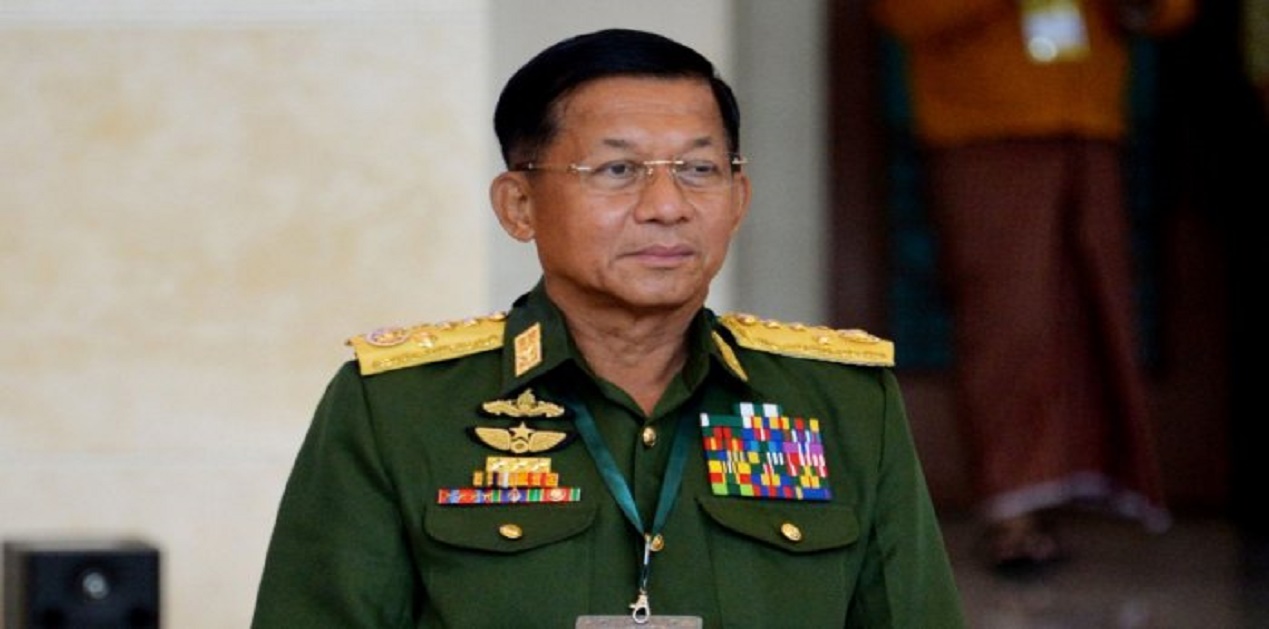It has been 150 days since the Myanmar military challenged the 2020 élections and took over its hegemonic shape on 01 February 2021. The political crisis has led to a humanitarian crisis in the country. The progress seen in the democratic process since 2010 has been stalled since the declaration of the military coup.
The Myanmar military, which emerged after independence in 1948, viewed itself as the ultimate defender of the nation’s sovereignty and freedom. Later, due to internal political turmoil a caretaker government was formed with military General Ne Win in 1958. Since the 1950s, the military started building its power base. In 1958, it published a document called “The National Ideology of the Defence Services”, which stated that the military had dual roles-defence and a socio-political role. Ne Win also established an entity called the Defence Services Institute (DSI), which started controlling economic sectors. DSI even took over an English-owned bank and renamed it the Ava Bank. DSI also controlled a newspaper and a publishing house.
With the rise in economic power and control, the military increased its importance, thereby becoming a state within a state. This was reinforced with the 2008 Constitution. The 2010 election held under the military drafted 2008 Constitution excluded the NLD party, and thereby the USDP won. In 2011, the NLD re-entered the democratic arena, and in 2012 by-elections, the NLD won 44 out of 45 seats contested. In November 2015, the NLD secured a majority in the parliament. The NLD led government, which came to power in 2015, did challenge the military-political and economic power however, the NLD’s unprecedented victory in November 2020 elections made the military question its position.
Though the reasons are uncertain and cannot be stated with evidence, the military challenged the election result and accused Aung San Suu Kyi under four violations of Export and Import Law, Natural Disaster Management Law, Section 505b of the penal code, and Section 67 of the Telecommunication Law. Min Aun Hlaing also made himself the de facto leader by removing the age restrictions, which stipulates the retirement age of the military Chief as 65 years. Just two months away from his 65th birthday, he changed the rule by issuing a directive and stated that the Commander-in-Chief and the Deputy Commander-in-Chief remain in their positions as long as the situation requires.1
After the coup, the elected lawmakers of the ousted civilian government formed the Committee Representing Pyidaungsu Hluttaw (CRPH). The CRPH announced its interim cabinet members under the National Unity Government to give itself structural and functional recognition. Abolishing the 2008 Constitution, the CRPH drafted a Federal Democracy Charter on 31 March. The CRPH reached out to several Ethnic Armed Organisations (EAOs) and ethnic political parties to form a more extensive opposition against the military regime.
Though at the surface level, it may seem that the EAOs are fighting the military as one collective unit, there are internal differences between each of these groups. In the present times, the Kachin Independence Army (KIA), the Karen National Liberation Army (KNLA), the Ta’ang National Liberation Army (TNLA) and Myanmar National Democratic Alliance Army (MNDAA) have launched attacks on Myanmar security forces. Even in Chin state and Sagaing Region, where the insurgency was never widespread, villagers have organised self-defence militias armed with homemade percussion-lock hunting muskets.
What is alarming is the spreading of the attacks in urban areas, which were till now isolated, despite the decades of ethnic conflicts in the country. The spread in the urban areas has therefore set the stage for a nationwide civil war. The military launched airstrikes against civilian targets in Hpapun Township and others and the widening geographical spread of the conflict has created fears of an emerging Syria like situation. According to the Assistance Association for Political Prisoners, the military has killed more than 800 people and detained more than 4000 individuals.
The military has stepped up its control over the journalists and media houses. On 08 March, the military revoked licences of five major media outlets — Mizzima, DVB, Khit Thit Media, Myanmar Now and 7DayNews. Around 56 journalists have been arrested, along with international journalists Yuki Kitazumi, a Japanese-born freelance reporter and a US-based Danny Fenster (Yuki Kitazumi was released in May). Now, the state-owned daily newspapers and state-run Myanmar television and radio publishers are predominantly reporting in the country. According to Reporters Without Borders, Myanmar ranked 140th out of 180 countries in Freedom of Information, 2021. The International Federation of Journalists has called on the UN to send a team of investigators into Myanmar to document the human rights abuses under the current conditions.
After the initial sporadic events of cutting the internet, the military completely cut internet access in Myanmar on 02 April. The military also introduced a cyber security bill that would allow the government to access internet user data, block websites, and imprison critics and officials who are not complying.2 According to the International Crisis Group report, the internet has become a virtual battlefield with military leaders limiting access to “whitelisted” sites. The military is also limiting access to only fibre data connections that is available to a limited population.3 Following these developments, Facebook banned “Tatmadaw True News Information Team,” which was the military’s official Facebook page, and Major General Zaw Min Tun, the military’s spokesperson page, along with the MRTV and MRTV Live “news” pages. However, the military had already banned Facebook and other social media platforms in February. Despite the national social media ban, Facebook’s decision holds importance as citizens access these platforms through virtual private networks (VPN).4
World over, a few years ago, democracy looked as though it would dominate the world. However, the progress made in the 20th century has stalled in the 21st century. In the second half of the 20th century, democratic institutions were established in most difficult conditions, such as Germany, which had been ruled by Nazism; in South Africa, which had been disfigured by apartheid. In the 21st century, democracy and democratic institutions have been going through difficult times. Even in established democracies, such as Europe and Asia, attacks on democratic institutions are spreading faster.
In the 2021 edition of Nations in Transit, covering the events of 2020, a total of 18 countries suffered declines in their democracy scores; only six countries’ scores improved, while five countries experienced no net change. This marked the 17th consecutive year of the overall decline in Nations in Transit, leaving the number of countries that are designated as democracies at its lowest point in the history of the report.5
The COVID-19 pandemic has fuelled a crisis for democracy around the world. According to the Freedom House Report, in 80 countries, democracy and human rights have worsened since the outbreak of the COVID-19 pandemic. Governments have responded by engaging in abuses of power, silencing their critics, and weakening or shuttering important institutions, often undermining the very systems of accountability needed to protect public health. The problem is particularly acute in struggling democracies and highly repressive states.6
Though it is being predicted that the coup will eventually fail as the military has less control over the country today, vis a vis what it had earlier. The coup has stalled the progress towards democracy and the peace processes that were underway. The Commander in Chief believed that the old tactics of military operations could work, as it had worked in the late 1980s, the early 1990s and even in 2007 following the “Saffron Revolution”. Nevertheless, Myanmar is now a completely different country. The citizens of Myanmar, especially the young, have experienced freedom with the country’s opening since the 2010s.
Charles Petrie a former UN Assistant Secretary-General, UN Resident & Humanitarian Coordinator Myanmar (2003-2007), has stated that the country is sliding into becoming a failed state. A failed state is defined by an environment of widespread corruption, criminality, and involuntary movement of populations, sharp economic decline, and violence. Given the socio-economic instability set in due to the COVID-19 pandemic, a failed state could further exasperate the dismal socio-economic conditions.7 Democracies are on an average richer than non-democracies, are less likely to go to war and have a better record of fighting corruption. More fundamentally, democracy lets people speak their minds and shape their own and their children’s futures. As Mahatma Gandhi has stated, “Democracy gives the weak the same chance as the strong”. Therefore, thousands of people in Myanmar risking their lives for this idea is a testimony to its enduring appeal.
Endnotes
- https://www.myanmar-now.org/en/news/min-aung-hlaing-makes-himself-military-supremo-for-life
- http://www.mediafiledc.com/military-junta-silences-opposition-and-fights-free-press/
- https://www.newsweek.com/myanmar-military-restricting-internet-access-except-whitelisted-accounts-1592469
- https://www.justsecurity.org/76047/beyond-the-coup-in-myanmar-the-other-de-platforming-we-should-have-been-talking-about/
- https://freedomhouse.org/sites/default/files/2021-04/NIT_2021_final_042321.pdf
- Freedom House research on the impact of COVID-19 on democracy and human rights, produced in partnership with the survey firm GQR. It is based on a survey of 398 journalists, civil society workers, activists, and other experts as well as research on 192 countries.
https://freedomhouse.org/report/special-report/2020/democracy-under-lockdown - https://www.irrawaddy.com/opinion/guest-column/myanmar-juntas-leadership-no-idea-forces-unleashed.html
(The paper is the author’s individual scholastic articulation. The author certifies that the article/paper is original in content, unpublished and it has not been submitted for publication/web upload elsewhere, and that the facts and figures quoted are duly referenced, as needed, and are believed to be correct). (The paper does not necessarily represent the organisational stance... More >>
Image Source: https://www.deccanherald.com/sites/dh/files/styles/article_detail/public/articleimages/2021/02/23/412902-01-02-1-954430-1614077848.jpg?itok=BOmzm8fv











Post new comment